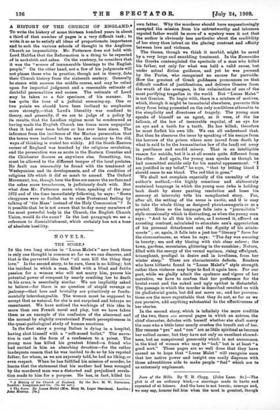A HISTORY OF THE CHURCH OF ENGLAND.* To write the
history of some thirteen hundred years in about a third of that number of pages is a very difficult task ; to write it so as to satisfy all ideas of proportionate importance and to suit the various schools of thought in the Anglican Church an impossibility. Mr. Patterson does not hold with Lord Halifax that the Reformation is a thing to be repented of in sackcloth and ashes. On the contrary, he considers that it was the "source of innumerable blessings to the English - people." On the other hand, not a few of his judgments will not please those who in practice, though not in theory, date their Church history from the sixteenth century. Generally he steers with success the middle course, and may be relied upon for impartial judgment and a reasonable estimate of doubtful personalities and causes. The estimate of Laud May be taken as a fair specimen of his manner. It has quite the tone of a judicial summing-up. One or two points we should have been inclined to emphasise more strongly,—that Land's liberality was confined to theory, and generally, if we are to judge of a policy by its results, that the Laudian regime must be condemned as having made the English Church ten times more unpopular than it had ever been before or has ever been since. The inference from the incidence of the Marian persecution that the towns were inclined to the new, the country to the old, ways of thinking is stated too widely. All the South-Eastern corner of England was touched by the religious revolution, and the persecution was as acute in the Eastern Counties and the Chichester diocese as anywhere else. Something, too, must be allowed to the different temper of the local prelates. No fault can reasonably be found with the treatment of Wesleyanism and its developments, and of the condition of religions life which it did so much to amend. The Oxford Movement, too, though here the fires are nearer the surface and the ashes more treacherous, is judiciously dealt with. But what does Mr. Patterson mean when, speaking of the year 1872 and of the time immediately following, he says : "Some clergymen were so foolish as to raise Protestant feeling by talking of 'the Mass' instead of the Holy Communion" ? Is it possible that be is not aware that to-day many members of the most powerful body in the Church, the English Church Union, would do the same? In the last paragraph we see a reference to disestablishment, which certainly has not a tone of absolute hostility.


































 Previous page
Previous page